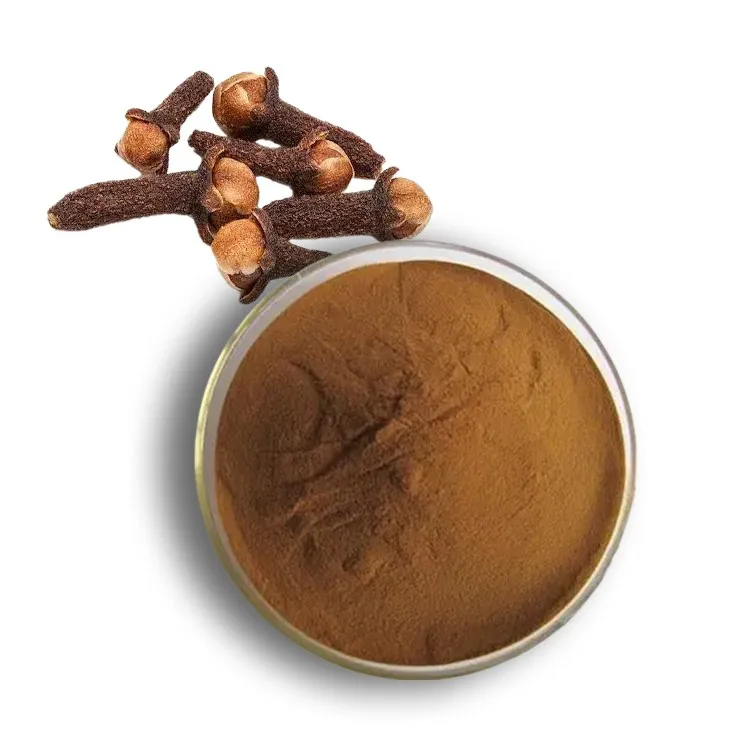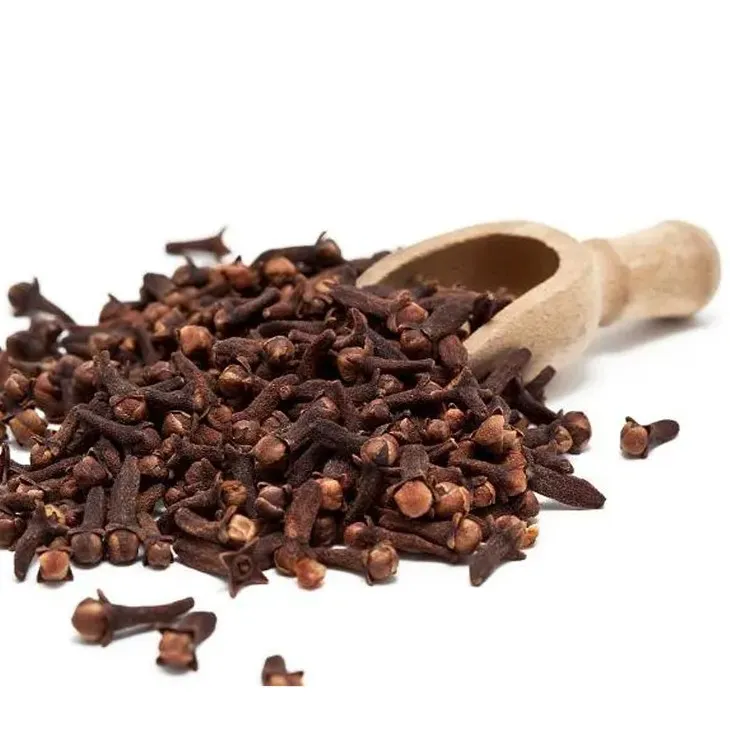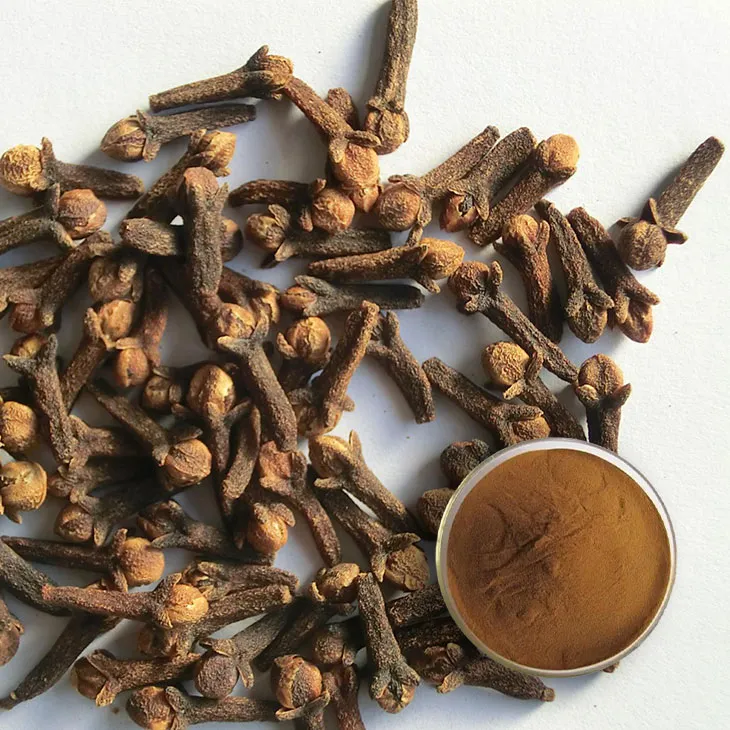- 0086-571-85302990
- sales@greenskybio.com
Supercritical Carbon Dioxide Extraction of Clove Powder
2024-11-30

1. Introduction
Supercritical carbon dioxide (CO₂) extraction has emerged as a prominent technique in the field of natural product extraction, and its application to Clove Powder is of particular interest. Clove Powder, derived from the dried flower buds of the clove tree (Syzygium aromaticum), is a natural material rich in various bioactive components. It has been used for centuries in different cultures for its distinct flavor and medicinal properties.
The unique properties of supercritical CO₂ make it an ideal solvent for extracting valuable substances from Clove Powder. Supercritical CO₂ exists in a state where it has properties of both a gas and a liquid, which allows it to have a high diffusivity like a gas and a high solvating power like a liquid. This enables it to penetrate effectively into the microstructure of the clove powder and extract the desired components with high efficiency.

2. Clove Powder: A Valuable Natural Material
2.1 Flavor Profile
Clove powder is renowned for its warm, spicy, and pungent flavor. It contains a complex mixture of volatile compounds, such as eugenol, which is responsible for its characteristic aroma. The unique flavor of clove powder makes it a popular ingredient in the flavoring industry. It is used in the production of various food products, including baked goods, candies, and beverages. In the culinary world, it adds a rich and distinct flavor to dishes, whether used in sweet or savory recipes.
2.2 Medicinal Properties
Historically, clove powder has been used in traditional medicine for a variety of ailments. It has antimicrobial, anti - inflammatory, and analgesic properties. Eugenol, the major component in clove powder, has been shown to have antibacterial activity against a range of pathogenic bacteria. This makes it potentially useful in the development of natural antimicrobial agents for use in food preservation and in the treatment of certain infections.
Additionally, the anti - inflammatory properties of clove powder may be beneficial in reducing inflammation in the body. It has been used in traditional medicine to relieve toothache, as it can numb the pain due to its analgesic effect. Some studies also suggest that it may have potential health benefits in areas such as digestive health and cardiovascular health, although further research is needed to fully understand these effects.

3. Supercritical CO₂ Extraction Technique
3.1 Principles
Supercritical CO₂ extraction operates based on the principle that when carbon dioxide is heated and pressurized above its critical point (31.1°C and 73.8 bar), it becomes a supercritical fluid. In this state, it has a density similar to that of a liquid, allowing it to dissolve a wide range of substances, but also has a viscosity and diffusivity closer to that of a gas. This unique combination of properties enables supercritical CO₂ to easily diffuse into the pores and cells of the clove powder, where it can dissolve and extract the target compounds.
3.2 Equipment and Process
The supercritical CO₂ extraction process typically involves a high - pressure extraction vessel, a pump to pressurize the CO₂, a heat exchanger to control the temperature, and a separator to collect the extracted components. Clove powder is placed in the extraction vessel, and supercritical CO₂ is pumped in. The extraction is carried out at specific temperature and pressure conditions, which are optimized for the extraction of the desired components from the clove powder.
After the extraction, the supercritical CO₂, now containing the dissolved compounds from the clove powder, is passed through the separator. Here, the pressure is reduced, causing the CO₂ to return to its gaseous state and the extracted components to be separated out. The CO₂ can then be recycled back into the system for further extraction, making the process more environmentally friendly compared to some traditional extraction methods that use large amounts of organic solvents.

4. Advantages over Conventional Extraction Methods
4.1 Mild Extraction Conditions
One of the major advantages of supercritical CO₂ extraction over conventional methods, such as solvent extraction using organic solvents like hexane or ethanol, is the mild extraction conditions. Supercritical CO₂ extraction can be carried out at relatively low temperatures, typically in the range of 35 - 60°C. This is important for the extraction of components from clove powder as it helps to preserve the integrity of the heat - sensitive compounds. In contrast, some traditional extraction methods may require high - temperature heating, which can lead to the degradation of certain valuable components in the clove powder.
4.2 High Extraction Efficiency
Supercritical CO₂ has a high solvating power, which allows it to extract a large amount of the desired components from the clove powder in a relatively short time. The ability of supercritical CO₂ to penetrate into the microstructure of the clove powder effectively means that it can access and extract components that may be difficult to extract using other methods. This results in a higher yield of the valuable components, such as eugenol, compared to conventional extraction methods.
4.3 Purity of Extracts
Since supercritical CO₂ is a clean and inert solvent, the extracts obtained from clove powder using this method are relatively pure. There is no residue of toxic organic solvents in the extracts, which is a significant advantage in applications where the extracts are used in food, pharmaceuticals, or aromatherapy. In contrast, traditional solvent extraction methods may leave behind traces of the solvents used, which may require additional purification steps to remove.
4.4 Environmental Friendliness
As mentioned earlier, supercritical CO₂ extraction is more environmentally friendly compared to traditional solvent extraction methods. CO₂ is a non - flammable, non - toxic, and readily available gas. It can be easily recycled in the extraction process, reducing the overall environmental impact. In addition, the absence of organic solvents in the extraction process eliminates the need for their disposal, which can be a significant environmental concern with traditional extraction methods.
5. Applications of Clove Powder Extracts
5.1 Aromatherapy
The extracts obtained from clove powder through supercritical CO₂ extraction are highly valued in aromatherapy. The pleasant and relaxing aroma of clove, mainly due to the presence of eugenol and other volatile compounds, can be used to create a calming and soothing atmosphere. Aromatherapy products containing clove extracts are used to relieve stress, anxiety, and promote relaxation. They can be in the form of essential oils, diffusers, or scented candles.
5.2 Traditional Medicine
In traditional medicine, the extracts of clove powder can be used in various forms, such as tinctures, ointments, or capsules. The antimicrobial and anti - inflammatory properties of the extracts make them potentially useful for treating skin infections, reducing inflammation in the body, and relieving pain. For example, clove extract - based ointments may be used to treat minor cuts, burns, or insect bites due to their antibacterial and analgesic effects.
5.3 Flavoring Industries
The flavor industry is a major consumer of clove powder extracts. The unique and strong flavor of clove can enhance the taste of a wide range of food and beverage products. Clove extracts are used in the production of baked goods, confectionery, and alcoholic and non - alcoholic beverages. They can add a spicy, warm note to products, and are often used in combination with other flavors to create complex and appealing taste profiles.
6. Future Perspectives
The supercritical CO₂ extraction of clove powder is a field with great potential for further development. Research is ongoing to optimize the extraction conditions to obtain even higher yields and purer extracts. There is also potential for the discovery of new bioactive components in clove powder through more advanced extraction and analysis techniques.
In addition, as consumer demand for natural and sustainable products continues to grow, the supercritical CO₂ extraction method for clove powder may become even more popular. It offers a clean and efficient way to obtain valuable extracts from this natural material, which can be used in a variety of industries. However, there are still challenges to be overcome, such as the relatively high cost of the supercritical CO₂ extraction equipment compared to traditional extraction equipment.
Future research may also focus on exploring the potential applications of clove powder extracts in new areas, such as in the development of natural preservatives for the food industry or in the field of cosmeceuticals. Overall, the supercritical CO₂ extraction of clove powder holds great promise for the future, both in terms of scientific research and commercial applications.
FAQ:
1. What are the main valuable components that can be extracted from clove powder by supercritical carbon dioxide extraction?
Eugenol is one of the main valuable components that can be extracted. It is responsible for much of the characteristic flavor and also has certain medicinal properties. Other components like flavonoids and some volatile oils may also be extracted, which contribute to the overall quality and functionality of the extract.
2. How does the supercritical CO₂ extraction technique penetrate the microstructure of clove powder?
Supercritical CO₂ has properties between those of a gas and a liquid. Its high diffusivity allows it to easily penetrate into the small pores and spaces within the microstructure of the clove powder. The pressure and temperature conditions in supercritical state can be adjusted to optimize the interaction between CO₂ and the components in the powder, enabling effective extraction.
3. Why is the extraction efficiency of supercritical carbon dioxide extraction higher than that of conventional methods in extracting clove powder?
Conventional extraction methods may have limitations such as longer extraction times and lower selectivity. Supercritical CO₂ extraction can precisely target the desired components due to its tunable properties. It can also reach areas within the powder more easily, and the mass transfer is more efficient under supercritical conditions, resulting in a higher extraction efficiency.
4. In which specific applications in the flavoring industry are the extracts from clove powder obtained by supercritical CO₂ extraction used?
The extracts can be used in the production of various food and beverage flavors. For example, in the creation of spicy and warm - flavored products like certain types of sausages, pickles, and some alcoholic beverages. They can also be used in the formulation of flavorings for baked goods to add a unique and pleasant aroma.
5. Are there any environmental benefits of using supercritical carbon dioxide extraction for clove powder?
Yes, there are. CO₂ is a non - toxic and non - flammable gas. Compared to some organic solvents used in conventional extraction methods, it is more environmentally friendly. After the extraction process, the CO₂ can be easily recovered and recycled, reducing waste and potential environmental pollution.
Related literature
- Supercritical Fluid Extraction of Bioactive Compounds from Clove Buds: Process Optimization and Antioxidant Activity"
- "Supercritical Carbon Dioxide Extraction of Clove Oil: A Review of Process Parameters and Product Quality"
- ▶ Hesperidin
- ▶ citrus bioflavonoids
- ▶ plant extract
- ▶ lycopene
- ▶ Diosmin
- ▶ Grape seed extract
- ▶ Sea buckthorn Juice Powder
- ▶ Beetroot powder
- ▶ Hops Extract
- ▶ Artichoke Extract
- ▶ Reishi mushroom extract
- ▶ Astaxanthin
- ▶ Green Tea Extract
- ▶ Curcumin Extract
- ▶ Horse Chestnut Extract
- ▶ Other Problems
- ▶ Boswellia Serrata Extract
- ▶ Resveratrol Extract
- ▶ Marigold Extract
- ▶ Grape Leaf Extract
- ▶ blog3
- ▶ blog4
-
Chinese Marigold Extract Suppliers.
2024-11-30
-
Organic Bilberry Extract, Australia.
2024-11-30
-
Organic Echinacea Extract, Australia.
2024-11-30
-
China Wheat Germ Extract Powder Suppliers.
2024-11-30
-
Curcumin Extract
2024-11-30
-
Kupilu Extract
2024-11-30
-
Andrographis Paniculata Extract Powder
2024-11-30
-
Citrus Aurantium Extract
2024-11-30
-
Genistein
2024-11-30
-
Lotus leaf extract
2024-11-30
-
Diosmin
2024-11-30
-
Astaxanthin
2024-11-30
-
Tinospora cordifolia extract
2024-11-30
-
Tongkat Ali Extract Powder
2024-11-30





















